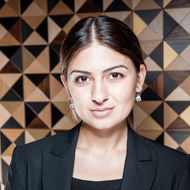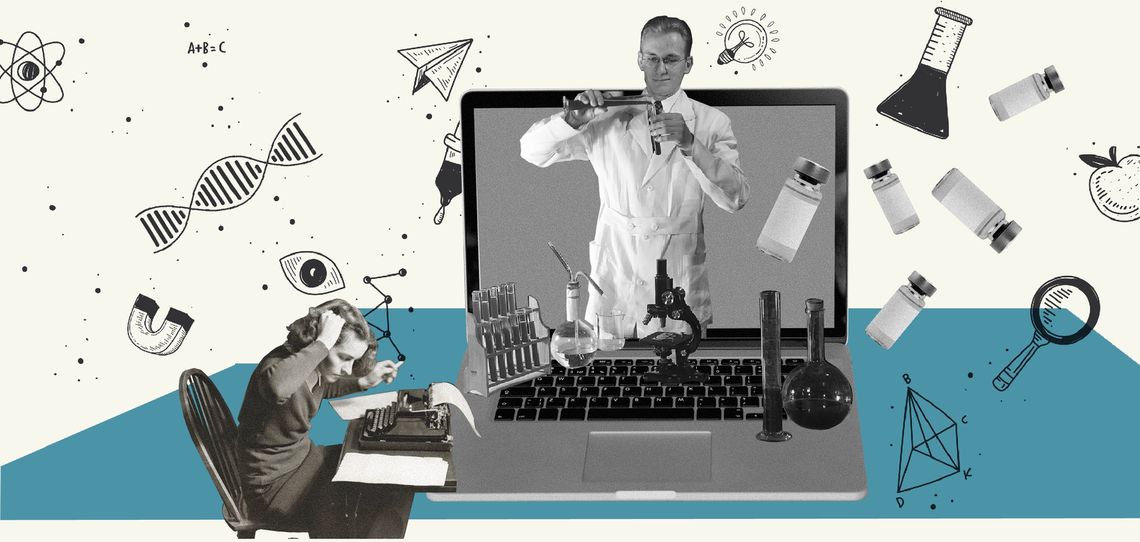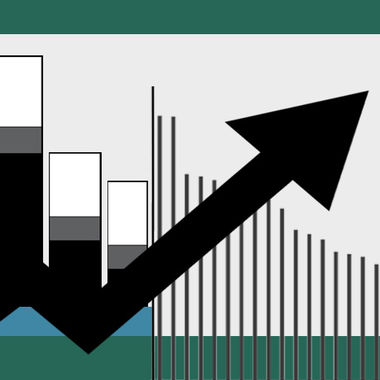Sun Apr 11 2021 · 7 min read
Gitak: Bridging Students With Supervisors for Science Research

By Tatev Mkrtumyan

Illustration by Armine Shahbazyan.
Which came first: the chicken or the egg? A similar dilemma faces the science and education sectors in Armenia: Do we need qualified scientists to secure better education, or do we need a better education system to produce world-class scientists? I will side with the former, define the problem, and present a solution.
There is a lack of academic supervisors in Armenian universities for student research projects. Some professors end up supervising up to 20 students at a time. This heavy workload leaves them with less time to craft an individualized approach. Moreover, some research areas have almost no qualified supervisors. One such field is machine learning (ML), as surprising as it may sound, considering the increasing interest in this technology. Hrant Khachatrian, the founder of YerevaNN ML research lab explained that most postgraduate students, who were supposed to take on the role of supervising a new generation, either left the country or went into industry.
“Anyone who has ever dealt with thesis projects of bachelor or masters students in Armenia will agree that we have a problem with research quality and students’ work culture,” Khachatrian explained, adding that students are not even familiar with the work culture in science and processes in academic research. “Hence, their thesis papers too often lack scientific value and quality. We need more supervisors who are familiar with modern developments in their field of science or industry, and will oversee student projects more carefully. However, we don’t have enough of them in Armenian universities. Instead, we need to take advantage of online opportunities and utilize the resources we have, both in the diaspora and the private sector of Armenia.” According to Khachatrian, a number of Armenian scientists at prominent universities worldwide are ready to lead research projects for students in Armenia via remote supervision, such as Areg Danagoulian, Professor of Nuclear Science and Engineering at Massachusetts Institute of Technology (MIT).
To bridge this gap, Khachatrian teamed up with Hayk Saribekyan and Areg Gevorgyan and founded Gitak.club - a platform where students and potential supervisors can meet each other. Hayk Saribekyan is a PhD student at the University of Cambridge, where he has witnessed very successful implementation cases for remote supervision. He now helps implement what may work best from his experiences, knowledge and vision. Areg Gevorgyan is the CEO of Innovative Solutions and Technology Center (ISTC), which has joint master programs at Yerevan State University (Applied Statistics and Data Science, and Data Science in Business). He confirms that there is a demand for more supervisors in their department and many others at different universities. The trio eventually came together and launched Gitak, which already has around 37 project submissions, 11 of which have already launched their research.
How does Gitak work? It consists of three simple steps:
- Supervisors add projects, which are usually 3-6 months long,
- Students apply for projects for which they meet the requirements,
- Supervisors choose students based on their applications and further interviews.
But what problems does it address specifically? Gitak is one solution for two core problems:
- Improving the quality of the students’ thesis projects and ensuring their scientific value,
- Connecting science research with the private sector.
Firstly, Gitak helps students find and get involved with current research projects and gain professional academic skills from a younger age. Khachatrian brings his example as a former student who used to work on an interesting research project with an experienced and professional supervisor. “I started working on a science project for my thesis paper at a younger age. I continued working on that research as a PhD student later, and it impacted my growth as a scientist and became a reason for me to stay and work in the science sector. This outcome was also thanks to my supervisor, who educated me for professional work in science. But such supervisors are rare in our academia and universities, and that’s the problem that we try to solve with Gitak,” Khachatrian said.
Most of the applicants are students who are motivated and looking for new learning opportunities. “But we’ve had a few cases where the students don’t show up during the interview or do not present themselves properly in the application forms. These problems indicate the lack of professional skills and work culture – areas we want to improve through Gitak, which is why we’ve suggested supervisors also include technical tasks in the application process to better understand students’ potential and commitment,” added Khachatrian.
Secondly, Gitak has research submissions from the industry sector as well. There are startups or technology companies that have scientific problems within their businesses that demand scholarly research. The supervisors of such projects are either former scientists who switched to engineering or other experienced engineers. Such projects allow students to learn the industry’s demands, as well as familiarize themselves with the work culture and the practical aspects of research. These projects may not reach students for their thesis papers through traditional procedures, due to the complex bureaucratic systems of most Armenian universities. The latter usually holds back business leaders from involving students in their research because they will have to spend much time and resources on recruitment without solid processes. Gitak helps them by creating a bridging platform with a simple and easy pipeline of students matched to projects from the industry.
“For example, we already have a project from a startup with quite a complex programming problem that will surely be interesting for students from the computational sciences,” Khachatrian said. “The supervisor from this startup has a PhD, but doesn’t have connections with the university. He prepared the project, submitted it to Gitak and was matched with students who are looking for such opportunities. This direction is not a primary focus yet, but it’s essential, so we plan on developing it more soon.”
Although Gitak targets students, it has started to attract others as well. An already employed applicant applied to a project from a prominent university where he could work with an experienced supervisor and gain world-class knowledge, which he may later put in practice in the industry sector. Hence, this can be another way of connecting research with businesses.
The projects in Gitak are diverse. Because all the founders are from the Computational Sciences (CS), they initially started to focus mainly on CS projects, especially machine learning. However, they quickly realized that Gitak is flexible enough to not limit the focus areas, so they started to also accept project submissions from other industries, ranging from bioinformatics to psycholinguistics, the social sciences, and so on.
“Interestingly, we receive projects outside of the computational sciences, though they require knowledge of programming. For example, biology, neuroscience, or even some economics projects require students to have programming skills. In Armenia, only CS students may meet the requirements for those skills. However, those project topics and fields will not appeal to them, so it becomes harder to find students qualified for such hybrid projects. On the other hand, such cases are great indicators of both the current state of science globally and the current state of the Armenian educational system, which is falling short of modern standards,” explained Khachatrian. He assumes that programming would be considered an advantage for most professions soon, regardless of the sphere. Hence, Gitak may help keep up with global trends and developments in R&D by indicating particular pitfalls and suggesting specific and practical solutions based on their real-case examples. Khachatrian believes that “we can modernize our education programs, resulting in our students becoming competitive specialists in the global market.”
In the long run, this will also help Armenia find its place on the international science scene with competitive quality of science research, talent and personnel. These can further attract more long-term and promising science projects. At the same time, remote supervision can further impact relocation of those supervisors. With such projects, these professors working in the diaspora can learn and study the opportunities in Armenia. They can grow connections and talent who later become their colleagues in new research projects or labs started here. For example, after completing one or more projects, a supervisor will already be familiar with Armenia’s opportunities, challenges and work culture. They will have connections and even a potential talent pool of researchers, which can motivate them to relocate and start an on-ground research lab.
Gitak also has room to improve and find new solutions in order to cope with the issues they find on the run. For example, even though most departments in Armenian universities are pleased with this initiative, bureaucracy holds back these projects from becoming thesis projects for students’ studies. As is the practice, students often cannot choose their topics or supervisors, since they are assigned one by their university. Thus, these students have to apply to Gitak’s project for its pure academic and educational value, and work on them separately from their thesis projects. Otherwise, they will need to “persuade” their departments to take on those projects for their thesis papers and work on them in the studies’ scope.
The ideal solution would be to build a procedure that will connect the university with “outside” entities, creating clear strategies for engaging supervisors and accepting projects outside of the university. This solution will expand the academic potential of universities and develop more connections between them and the business sector.
also read
High Tech, Low Culture: Armenian Creative Industries and New Media
By Vahram Akimyan
This is not a cyberpunk essay about a dystopian future, but rather an attempt to take a pragmatic look at creative industries and the landscape of digital culture in Armenia.
Astrophysicist Garik Israelian on Starmus, the Music of Stars and Gravitational Waves
By Tatev Mkrtumyan
Dr. Garik Israelian led the international collaboration that provided the first observational evidence that supernova explosions are responsible for the formation of black holes.
Armenian Startups in Deep Tech: How Krisp is Breaking New Ground
By Tatev Mkrtumyan
Deep tech startups are built on scientific and engineering discoveries and innovations. In the Armenian startup ecosystem, there are only a handful of deep tech startups. One of them is Krisp.
Information Technologies and General Education in Armenia
By Narek Manukyan
Different forms of distance learning have been introduced in Armenia for three weeks now. What do we know about the use of information and communication technologies in the general education system of Armenia?
Aligning Communication, Policy and Finance: Where Are We on the Road to a Knowledge Economy?
By Samson Avetian
State budget allocations for education, science and research domains are particularly important, writes Samson Avetian. As labor force quality is one of the main drivers of productivity growth, this variable is critical for Armenia to flourish.
podcast
Amalya Yeghoyan, Project Manager of Enterprise Incubator Foundation (EIF), speaks about a number of their programs including women’s entrepreneurship, programming courses for veterans of the 2020 Artsakh War and the recently launched Armenian Engineering City.








